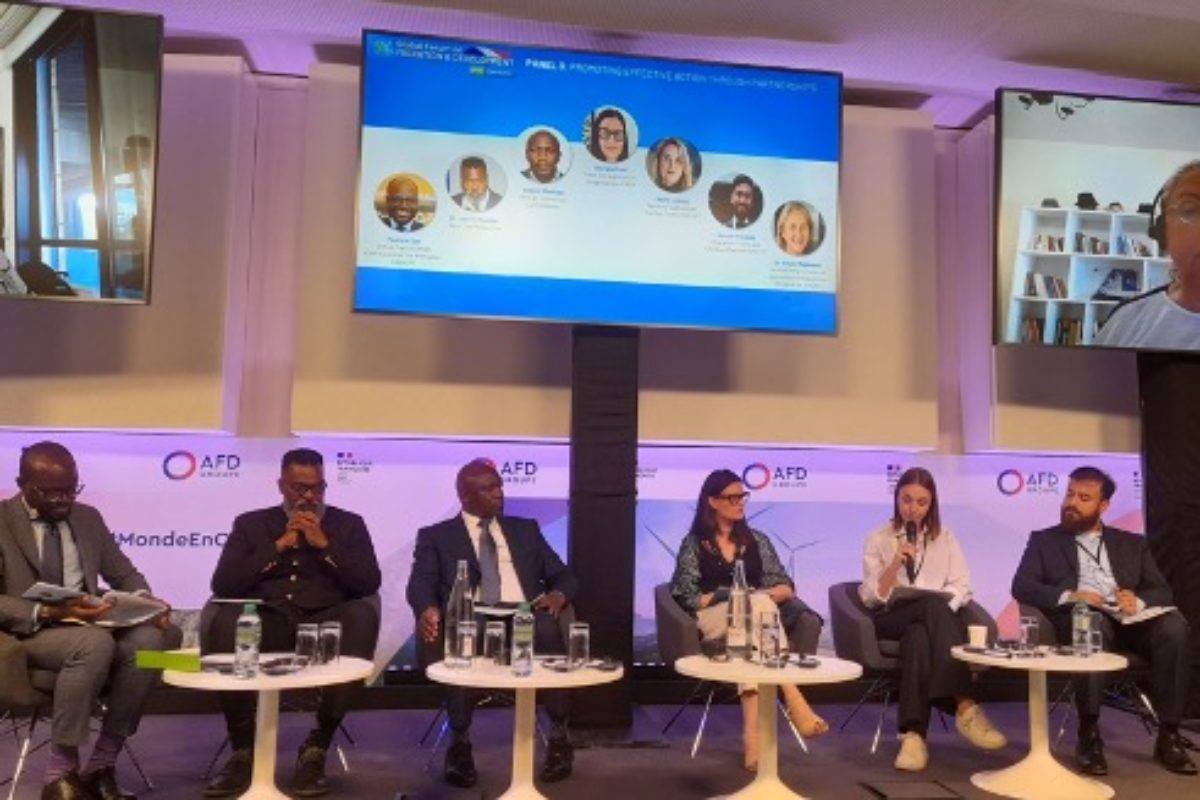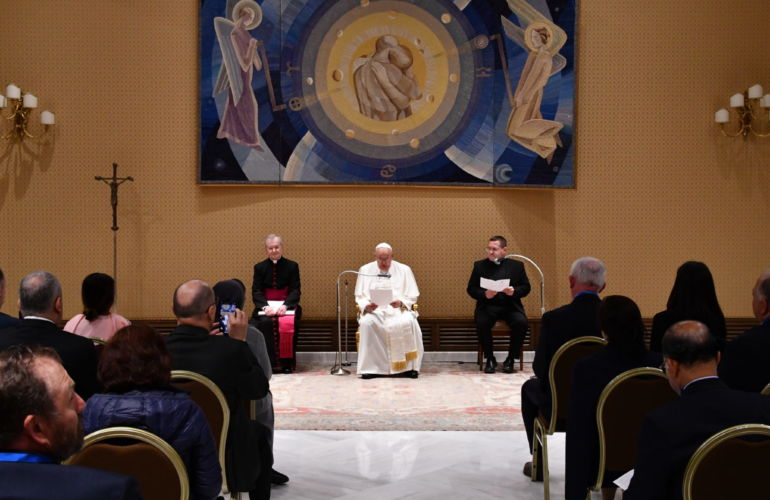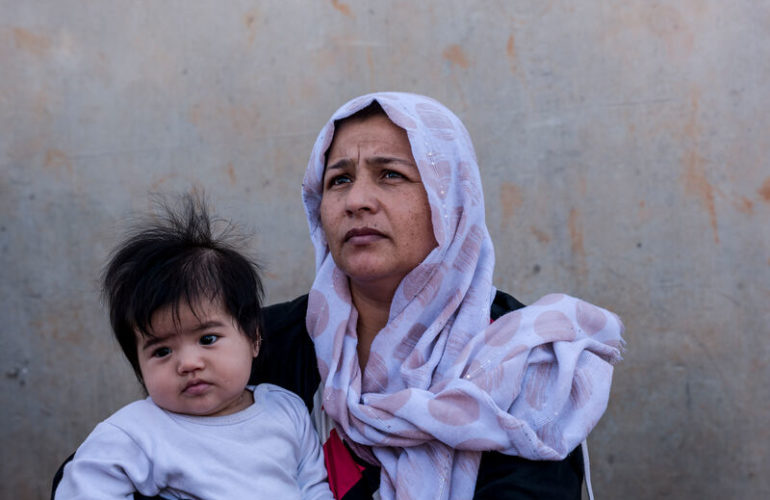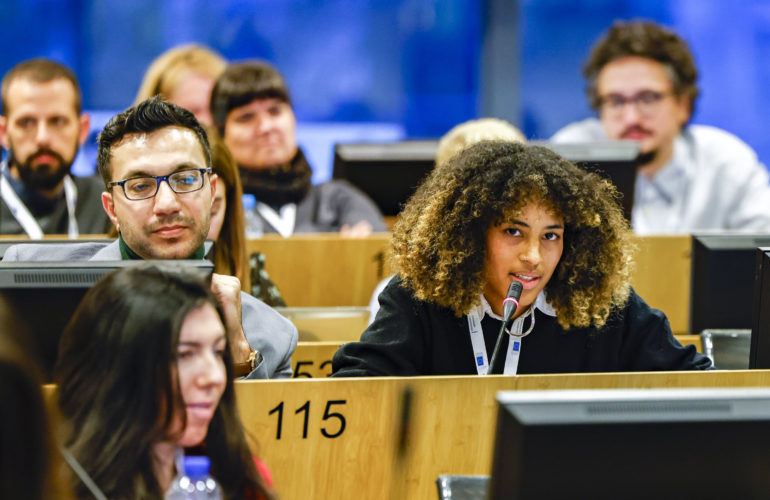Bringing Civil Society Voices to Global Discussions on Migration and Development
Coordinated by ICMC, the GFMD Civil Society Mechanism facilitated civil society contributions to workshops in Paris on migration, climate change, culture, and diaspora, in the lead-up to the 14th GFMD Summit in January 2024

On 27 and 28 June, the Global Forum on Migration and Development (GFMD)* hosted two thematic workshops in Paris: on ‘Culture, Narratives and Human Mobility’ (hosted by the French Museum of the History of Migration, 27 June), and ‘Climate and Human Mobility’ (hosted by the French Development Agency, 28 June). The hybrid workshops brought together States and other key GFMD stakeholders, including civil society, to provide insights and inputs for the respective thematic roundtables of the 14th GFMD Summit, to be held in Geneva on 23-26 January 2024.
The French Chairmanship of the GFMD process began in July 2022. Since then, ahead of the 14th GFMD Summit the government of France has been coordinating a year-long program of workshops and events focused on the GFMD’s thematic priorities for 2022-24. In its capacity as the Civil Society Mechanism of the GFMD, ICMC facilitates the engagement of civil society organizations in the GFMD process. “After a couple of years hiatus, the GFMD this year is even more critical,” said Civil Society Mechanism Coordinator Colin Rajah, addressing the importance of the GFMD and its dialogues at this time. “It is critical not only to rebuild multilateral trust and understanding among States, but also to recreate a truly multi-stakeholder space where real cooperation and action among a wide range of actors and contributors are primary outcomes, rather than ideas to which public officials pay lip service.”
The Paris workshops addressed the impact of climate change on human mobility as the central theme of the French GFMD Chairmanship for 2022-24, and diaspora and public migration perceptions/discourses as two of its six GFMD thematic priorities. “It is truly significant that the GFMD is addressing the theme of culture for the first time,” explained Oumou Diallo, Associate Policy and Communications Officer. “It allows us to discuss contributions of migrants beyond financial aspects, and to explore the different identities of migrants and their influence on communities and creative industries. For civil society, the topic of culture also brings to light the important question of the restitution of artifacts, which can no longer be ignored.”
Bringing Global Civil Society Voices to the GFMD Process
Both events in Paris featured selected civil society experts as panel speakers, with a broad range of civil society and other stakeholders participating in workshop discussions, both in-person and online. To ensure workshop discussions further benefited from inputs from civil society stakeholders around the world, during the week leading up to the Paris workshops, the GFMD Civil Society Mechanism held a global virtual civil society consultation.
Responses from civil society organizations, trade unions, and other non-state actors shaped key civil society advocacy priorities for presentation during discussions at the Paris workshops, illustrated with supporting regional and national examples. “Our consultation process, held regularly before GFMD preparatory meetings and workshops, is a key pillar of the meaningful, self-organized participation that we work to facilitate’, said ICMC Policy Officer Elana Wong. “Not only is it a crucial opportunity to engage networks and members to discuss and consolidate their priorities, but also provides a rare space for global civil society to gather together and exchange as a community.”
Civil Society Perspectives: Culture, Narratives and Human Mobility (Paris, 27 June)
The 27 June workshop opened by exploring approaches to building fair and evidence-based public narratives and perceptions of migration.
Panelist Cecilie Kern, Chair of the NGO Committee on Migration, called for a dual approach that balances broad information about migration trends with individual and personal narratives of migrants and their families. “We need both lenses to shape public perceptions that are both evidence-based and emotionally compelling,” she explained. “Narratives are about creating a system of stories that transcends individual experiences, and provides a values-based way of understanding something.”
Calling for more and better quality data to evidence the experiences of migrants and the structural barriers they encounter, Kern highlighted both the wealth of relevant knowledge and expertise within migrant and diaspora communities and the importance of centering migration policymaking on migrants’ lived experiences. Her intervention echoed responses to the preceding civil society consultation, which highlighted the importance of individual migration stories and urged more focus on host and transit countries in this regard.
Subsequent workshop sessions considered the role and contributions of diasporas as agents of cultural, economic, and social change.
Speaking on behalf of the Forum of International Solidarity Organizations for Migration (FORIM), Brice Monnou and Khady Sakho highlighted ongoing issues of migration terminology, new perspectives of migrant youth, and diaspora communities’ unique position and potential as agents of change and innovation in countries of residence and origin. Bringing forward a key civil society consultation priority to address historical inequalities, Onyekachi Wambu, former Executive Director of the African Foundation for Development (AFFORD), highlighted how Africans are often prevented from studying their cultures and histories due to the continued holding of artifacts and objects, taken during colonization, in Western museums and galleries. He highlighted the economic opportunities of cultural and heritage tourism that could be expanded by the continent via the return of objects and artifacts, citing the $1.8bn spent by 1.5million people from historic diasporas visiting Ghana as cultural and heritage tourists during the 2019 Year of Return.
Civil Society Perspectives: Climate and Human Mobility (Paris, 28 June)
The second day’s workshop focused on the relationship between migration and climate change from the perspectives of both youth and indigenous communities.
Echoing calls for more robust, comprehensive, and community-generated data in responses to the civil society consultation, Lukmon Akintolafrom the Climate, Migration and Displacement Platform (CMDP) and the Migration Youth and Children Platform (MYCP) underlined the crucial importance of engaging local and frontline communities through respectful, non-extractive collaboration, and humanizing data with individual stories so “numbers make sense” to policymakers.
Marie Lobjoy of Secours Catholique/Caritas France pointed to the complex impacts of climate change and environmental degradation, in terms of both sudden disasters and slow-onset phenomena such as coastal erosion and access to drinking water. Using testimony from individuals worldwide affected by climate-related displacement, she illustrated the varied roles that climate factors play in influencing migration decisions and exacerbating the root causes of displacement.
Pefi Kingiof the Pacific Island Association for NGOs (PIANGO) emphasized localization, or the grassroots, ‘bottom-up’ development of policies and interventions, as crucial to strengthening community resilience and reducing adverse effects. Mirroring the civil society consultation priority of embedding frontline communities in developing solutions and using the full range of community expertise, she called for data and discourse to be indigenized, alongside ensuring that non-economic cultural and spiritual losses are treated with equal importance within discussions on loss and damage.
****
* The GFMD is a state-led, informal, and non-binding process that helps shape the global debate on migration and development and allows governments – in partnership with civil society, the private sector, local and regional governments, youth and other relevant stakeholders – to analyze and discuss sensitive issues, create consensus, pose innovative solutions, and share policy and practices.
Find out more about the GFMD Civil Society Mechanism and the 2022-24 GFMD.

Rachel Westerby
Independent writer and researcher on migration, refugees and human rights.



